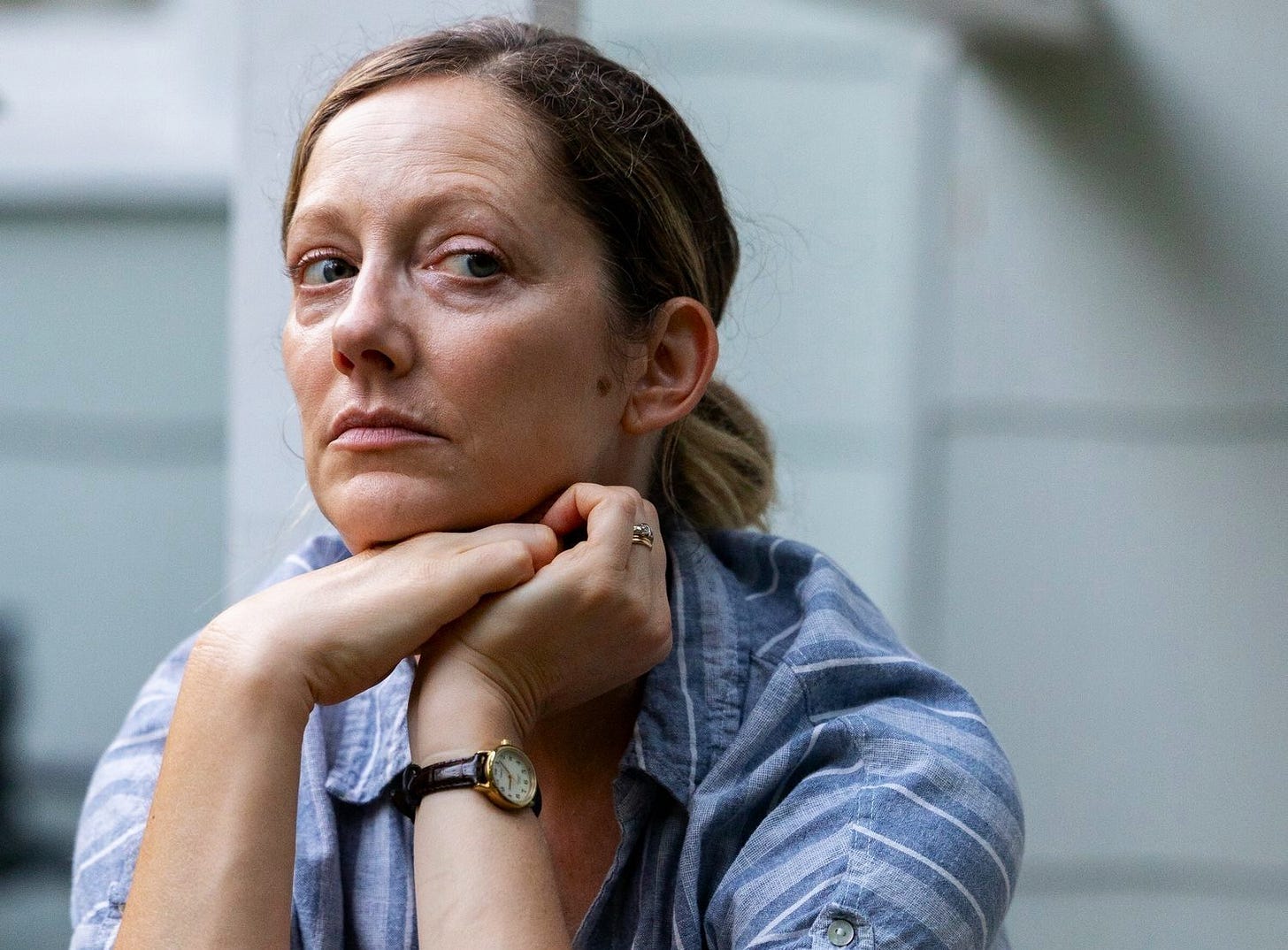Eric LaRue (2025) Melancholic study on grief from Michael Shannon
“Through trial, you achieve grace”

“I wish that for just one time you could stand inside my shoes
And just for that one moment I could be you
Yes, I wish that for just one time you could stand inside my shoes
You’d know what a drag it is to see you”
“Positively 4th Street” by Bob Dylan
Written by Brett Neveu and based both on his 2002 play of the same name and in response to the Columbine school shooting 3 years earlier, Eric Larue was filmed across the months of August and September in 2022 before its world premiere at the Tribeca Film Festival in June of the following year but remained unreleased until nearly 2 further years later here in April of 2025. Such delays would lead you to believe, as is cinematic wisdom it seems, that there were directorial issues, a grumbling on the final cut perhaps or distribution problems, none of which I can confirm from my brief meander through the maze of the internet Matrix. But what I can confirm, after watching this film without any knowledge of the subject matter, previews, trailers or reviews, is that Michael Shannon has spun an often awkward, jarring and disturbing tale of loss and grief through the complex melancholic shadows of living with the aftermath of someone else’s actions brilliantly in his directorial debut here.
Shadows and reflections permeate the film as often as Jonathan Mastro’s musical score of clashing and discordant sounds that grind at the edges of a tension constantly heightened by awkward and jarring conversations from a cast of characters trying to absorb the enormity of the heartbreaking tragedy that has befallen their small and tight knit community centred around the bombast and bluster of one church and the more human and reasoned approach of another. Religion too is a huge through line of the film, of two churches with varying different approaches to faith and devotion almost competing and vying for the affections of their parishioners, two of which are our central characters, parents thrust into the maelstrom of dealing with the horrors inflicted by their own son on their own friends and neighbours and trying desperately to make sense of the senseless. Whereas husband and father “Ron” (Alexander Skarsgård) seeks the sanctuary of the church and the warming embrace of a preacher and a saviour, we have a broken and bewildered wife and mother “Janice” (Judy Greer) trying desperately to come to terms with the actions of her son as well as wanting to apologise and find meaning to both his actions and to her own feelings for a life and reason for being now splintered apart.
I’ve long been an admirer of Michael Shannon the actor and here, he’s excelled in a quite brilliant debut from behind the camera and come the film’s conclusion and “Positively 4th Street” by Bob Dylan (but performed here by Scott Lucas and the Married Men), I hope, despite its downbeat themes and melancholic air, you’ll feel the same, and here’s hoping the film garners a huge audience now it has a worldwide release.
My dissection of the opening 12 minutes or so of Eric LaRue:
Following minimal opening production credits, a fade to black and the beginnings of Jonathan Mastro’s jagged and jarring clashing of musical strings we cut to a dark, dimly lit and foreboding corridor of what appears to be a prison before we immediately cut for the first time to “Janice LaRue” (Judy Greer) lost in thought, her eyes circled red and glistening with tears, sat behind the steering wheel of her car. A series of firsts for the film now commence: Janice now seen for the first time in the reflection of a supermarket window exiting her car to being bathed in shadows at the entrance to the supermarket and importantly, the first words of the film and the first time Janice, almost absently minded, exclaims “I’m sorry” to a shopper exiting the supermarket. Inside now, we follow Janice in a slow motion shot from behind so reminiscent of this year’s Companion as she picks a cereal box from the shelf and now framed from the front, a slight smile, her first of very few in the film is evident, before she’s startled back to a lost and broken reality by fellow shopper and Presbyterian Pastor “Steve Calhan” (Paul Sparks). An awkward and stilted conversation ensues, the first of many in the film, as Janice exclaims “I haven’t been ignoring you” before the pastor replies through reassuring smiles “Just call or come by the church, if you ever wanna talk again”.
Constant cuts now as their awkward conversation continues, a pastor and family friend smiling at the lady and parishioner of his church cradling a cereal box akin to a young child, lost, broken, bewildered and without the hint of a smile to share with anyone. Although her son remains unnamed at this point, Steve asks if she’s visited him in prison as any remaining colour drains from her face. “You might wanna be more concerned” he rather unhelpfully announces and despite Janice’s look of scorn and contempt for even stating this, he continues “He’s up there, without any family”. Still hugging the box of cereal, Janice, irritated and tired from a conversation she clearly doesn’t want or planned to engage in snaps “Eric killed those boys. He shot them” and long after Steve has smiled his way through asking her to visit the church soon, Janice is framed looking at her pastor with zero words of reply for him, lost in a world of grief and despair.
We cut to a close up of an equally lost and bereft “Ron LaRue” (Alexander Skarsgård) as his eyes somewhat sparkle and come to life as he unwraps a bible in the home he shares with Janice. Affixing his glasses to the bridge of his nose, Ron flicks through this brand new bible before stopping and smelling the pages and then mouthing a few words from a chosen chapter as we cut to a wider shot of the family home and Janice entering through the front door. An immediate cut now and our first deliberate glimpse of their son’s locked bedroom door and with barely a word exchanged between them as Ron remains seated in the lounge and Janice immediately in the kitchen, Ron announces they’ve been invited for dinner at the weekend by a friend from the nearby Redeemer Church of which he’s a passionate patron. “I don’t think I’m up for that just yet” she replies as Ron cheerily continues by inviting his wife to attend the church with him and before that, dinner with another friend of the church at a local restaurant and sensing his wife is preoccupied, tight, stressed and down, another of the firsts of the film as Ron offers to give his wife a neck massage. Declining all three in short order, their awkward conversation is broken by the tooting of a car horn outside and a lift to both the restaurant and that evening’s prayer meeting from “Lisa” (Alison Pill) as Ron hurriedly excuses himself with a departing “I’ll see you later” which receives zero response or recognition from Janice who now watches her husband eagerly hugging Lisa and full of smiles as he turns his gaze back to the family home and his wife in the window, lost and without the faintest hint of a smile or wave.
Later in the evening we now find Janice sat in the dark, watching a documentary on the television. She’s framed again clutching her chest as though cuddling herself or a young, newborn baby as for the second time director Michael Shannon cuts to a close up of the closed bedroom door of her son and now back to Janice, glassy eyed and padding away several tears as they roll down her cheeks as we now see her son’s bedroom door for the third time in the opening seven minutes of the film as Shannon slowly inches his camera from the documentary on the television to the locked door nearby.
Lighting a cigarette outside in the dark, her back resting against a tree, both Janice’s and our eyes are drawn to a child’s swing in the foreground and perhaps a shed containing her son’s childhood toys in the deeper background as we cut to Janice still smoking but now sat on a park bench, her back to three teenagers in the near distance larking around a slide in a public park. Walking into shot, Janice smiles fully for the first time in the film before a curtailed second smile soon dissipates as quickly as the teenagers stop talking and can only stare in stunned and shunned silence for the broken and angry lady in the dark shadows of the night now stamping on her cigarette butt and walking away.
After cutting to a wide and long distance shot of Janice loudly slamming the front door of her home we cut to the following morning and the lighting of another cigarette as she drives to work. Passing a church and now stationary at a red traffic light, she dabs away tears from her reddened eyes before we find her clocking in at work and although not shunned by a fellow worker as she does so, there is zero warmth for her return to work until a duty manager greets her warmly, if awkwardly. Stacking shelves in a multi-purpose store, a customer requests her help and a “quick question” regarding the array of guns on display in a nearby department. With a reluctant smile, Janice joins the customer in front of the rack of guns but quickly it’s evident that the customer isn’t interested in the guns but rather intimidating Janice and associating these guns with her son. Despite trying to remain calm and professional, Janice is badgered until breaking point, calling out in distress for help before shouting at the customer who soon departs with a despicable smile.
The scene ends with the customer laughing in a far corner of the store and Janice all alone as we dissolve past her and to the guns now fully in focus, to a distressed Janice slapping the steering wheel of her car in anger on her return journey home…
Thanks for reading. I hope this message in a bottle in The Matrix finds you well, prospering, and the right way up in an upside down world.
Whilst you’re here I may as well brag about the release of my trilogy of recently self-published books. Beautiful covers eh! As the title(s) would suggest, this is my life at the movies or at least from 1980 to 2024, and in volume 1 you’ll find 80 spoiler free appraisals of movies from debut filmmakers, 91 of the very best films appraised with love and absent of spoilers from 1990–2024 in volume 2, and in volume 3 you’ll find career “specials” on Paul Thomas Anderson and Quentin Tarantino together with the very best of the rest and another 87 spoiler free film reviews from 2001–2024.
All available in hardback and paperback and here are some handy links:
"A Life at the Movies Vol.1" - link to Amazon
"A Life at the Movies Vol.2" - link to Amazon
"A Life at the Movies Vol.3" - link to Amazon





